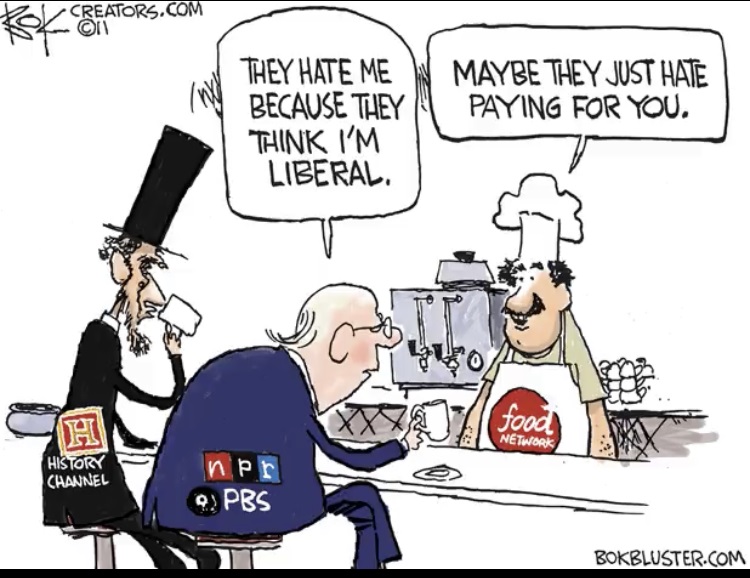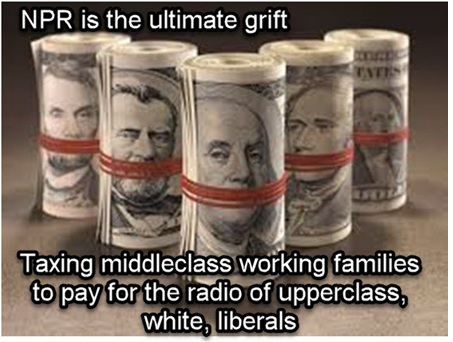I urged Tea Party Republicans to defund PBS and NPR in 2011 and then made the same recommendation to Trump in the first year of his first term.

My argument, as captured by this cartoon, has nothing to do with left-wing bias.
Instead, I favor limited government.
And I’m hoping that Elon Musk’s Department of Government Efficiency will be more receptive to the message that there’s no reason to have government media outlets.
In a column for the Washington Post, George Will explains why taxpayer money should not be squandered in this fashion. Here are some of most important passages.
The lowest of the low-hanging fruit for budget-cutters is the Corporation for Public Broadcasting… Last year’s appropriation of $535 million brought spending on the CPB to over $15 billion since its 1967 founding. …The federal subsidy is about 15 percent of the funding for all public broadcasting. If the viewers, listeners and others who volunteer the other 85 percent enjoy the CPB’s offerings as much as they say, surely they will provide the other 15 percent.
They should know that government’s share is a regressive transfer of wealth: The average American household income is less than that of the average income of PBS viewers and listeners to the CPB’s NPR. …
CPB is like the human appendix — vestigial, purposeless and susceptible to unhealthy episodes. In 2025, it is a cultural redundancy whose remaining rationale is, amusingly, that government should subsidize its programing because so few want it. …If Republicans mean a syllable of what they say about pruning federal functions, they will begin with the Corporation for Public Broadcasting.
A couple of years ago, Mike Gonzalez pointed out the bias of government media in an article for National Review.
Here are some excerpts.
Public broadcasting ceased long ago to reflect the views of the American public. Today, in fact, it serves coastal elites who disdain the public. …PBS and NPR reflect only the views of either the administrative state or the identitarian Left — regularly using, for example, the term “Latinx,” which is embraced by 2 percent of Americans of Latin background but offends 40 percent. ….
NPR and PBS routinely air views that are stomach-churning to at least half of America, propounding the idea that America is systematically racist, that whites enjoy “privilege” no matter what their station in life, and that slavery is at the very center of our national narrative, constituting our sole origin story. They use your dollars, in other words, to change your country through the use of critical race theory as well as woke gender ideology. …the Corporation for Public Broadcasting has requested half a billion dollars from Congress. Time to spend that money elsewhere.
Given the focus of his column, I’m sure Mike will appreciate this bit of satire.
Let’s close by going back a few years more and looking at these excerpts from Bill Wirtz’s column for the Foundation for Economic Education.
He explains that the market should determine the success of media outlets.
In the effort of maintaining “quality journalism,” publishers and journalists around the world make the case for press subsidies. …But is the state really needed to produce quality content? …With public ownership or subsidization, the stations lose their independence when it comes to critically analyzing a government’s policies. …PBS and NPR actually wouldn’t disappear if government funding were cut. They simply would be forced to operate under the same economic pressures as other U.S. media. …
Should it be left up to a roomful of bureaucrats to establish a collective standard of quality information? …diversity of choice…makes the consumer pick winners and losers in the marketplace of media. We should not let the established media tell us that this is the best it can get and that we need public money to sustain it.
My thoughts today are the same as they were in 2011 and 2017.
Government-financed media is bad fiscal policy and bad journalism policy. All handouts should end immediately. And if DOGE and/or Republicans actually go after NPR and PBS, they should eliminate rather than cut. That would at least make it harder to reinstate funding in the future.
P.S. Since America is stumbling toward a Greek-style fiscal crisis, I may as well point out that there was a fight over government-subsidized media when Greece suffered its fiscal collapse. Somehow, I doubt American politicians will learn any lessons.

No comments:
Post a Comment